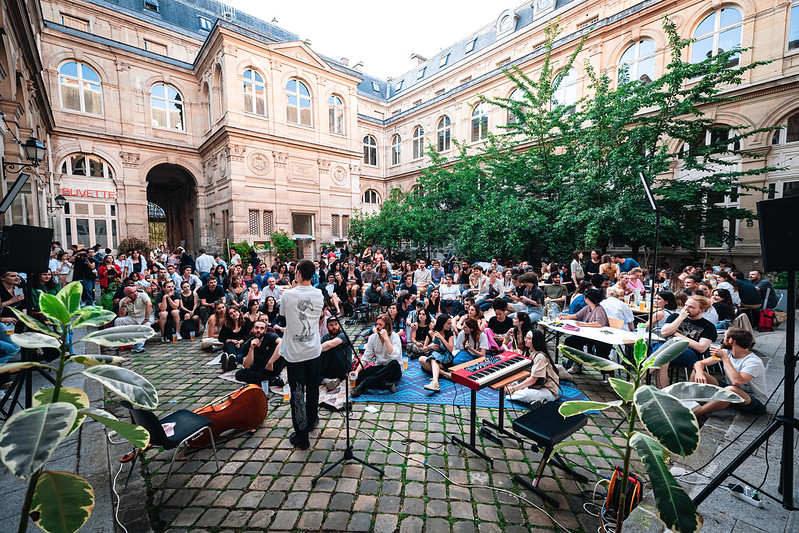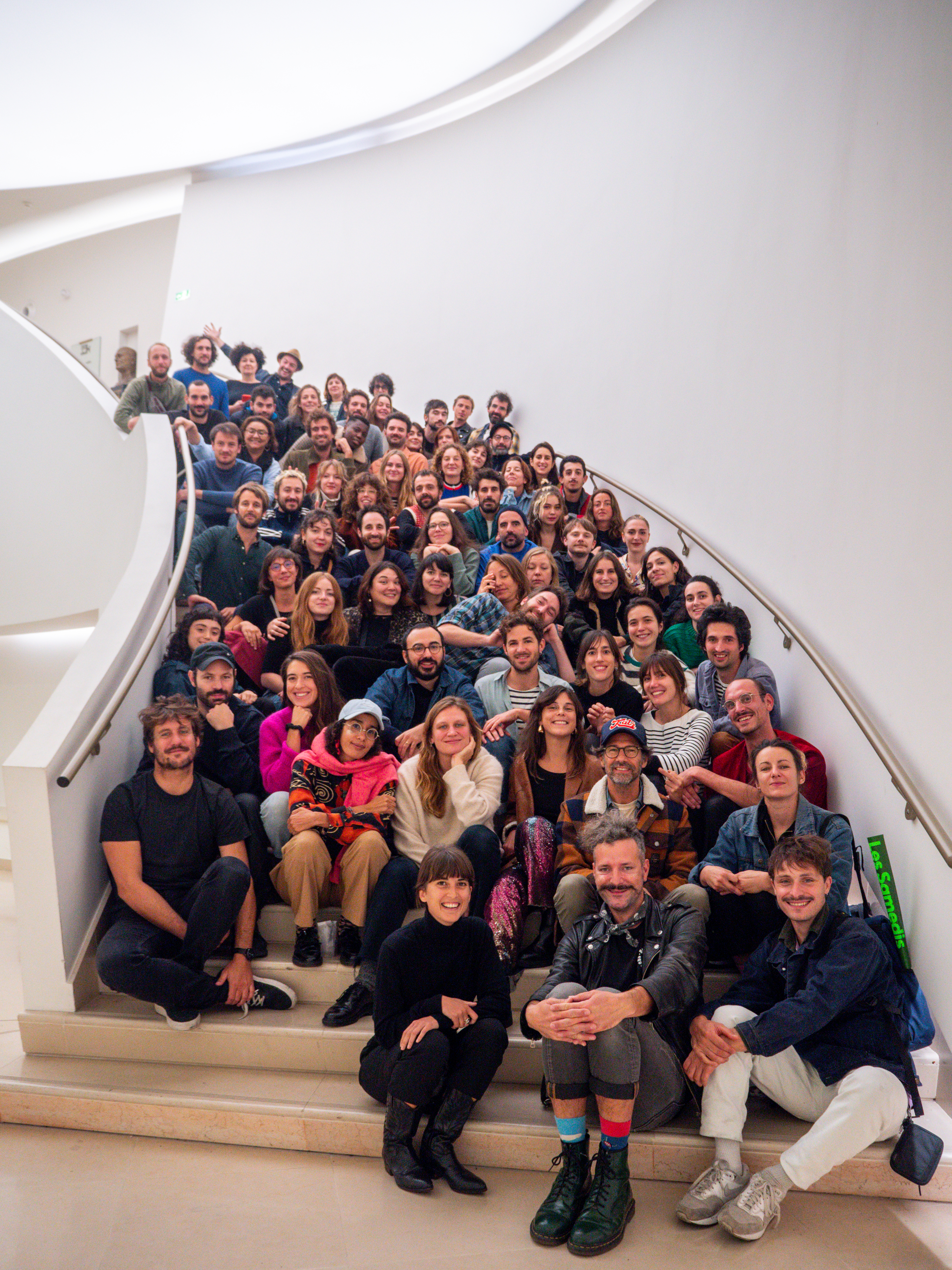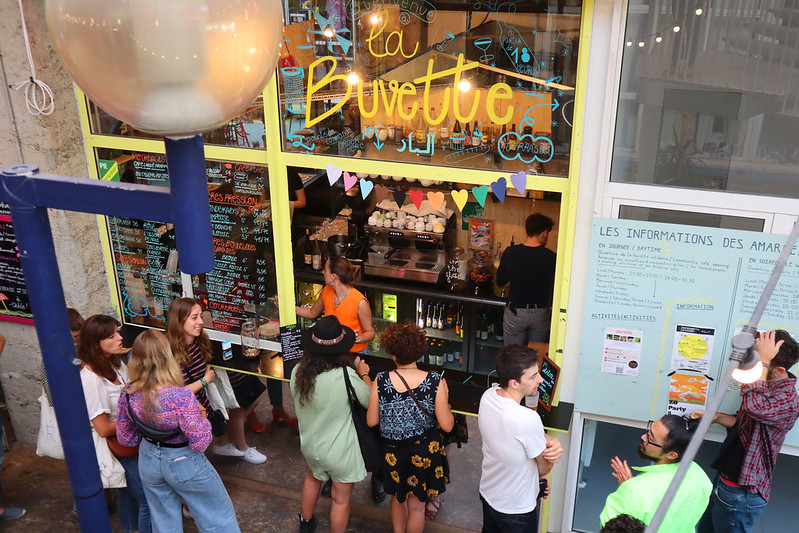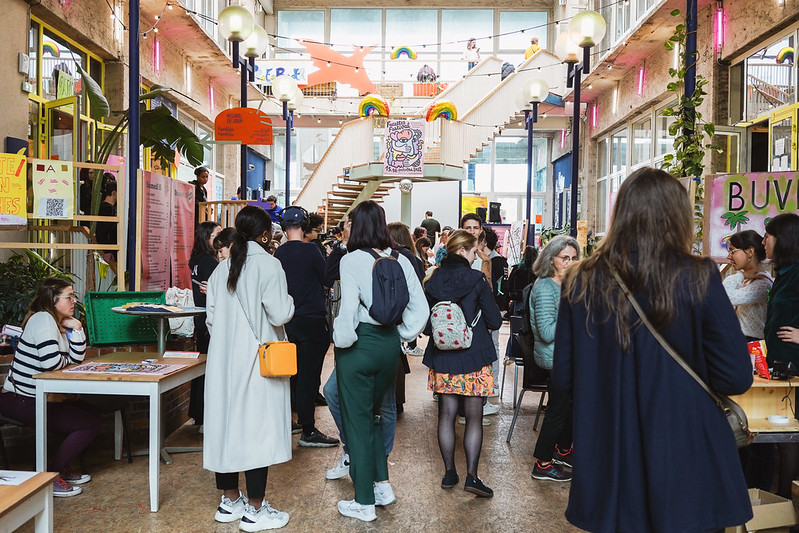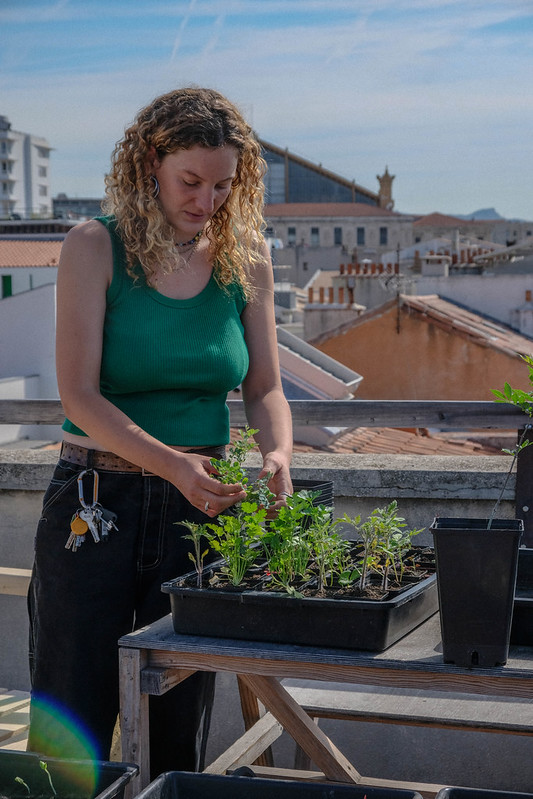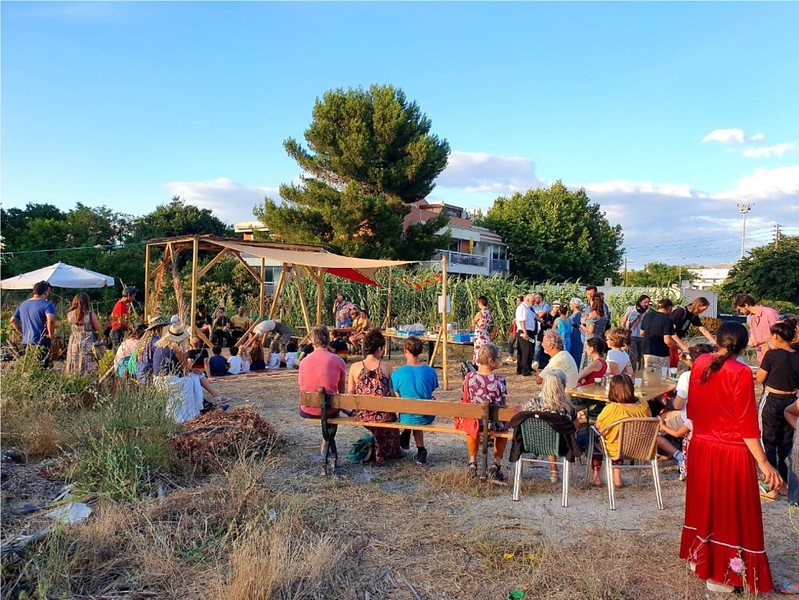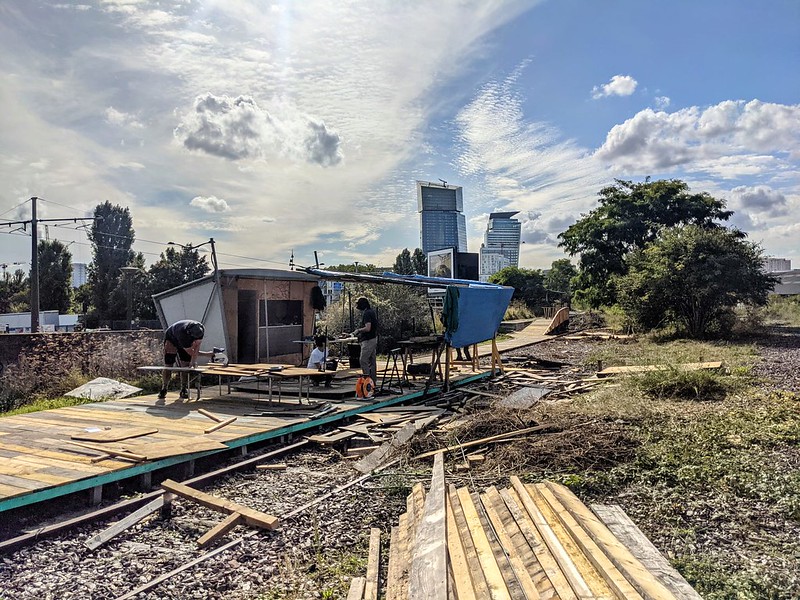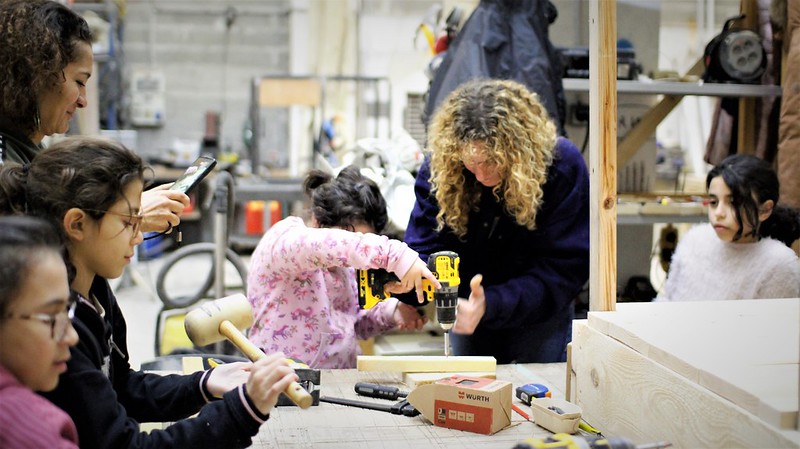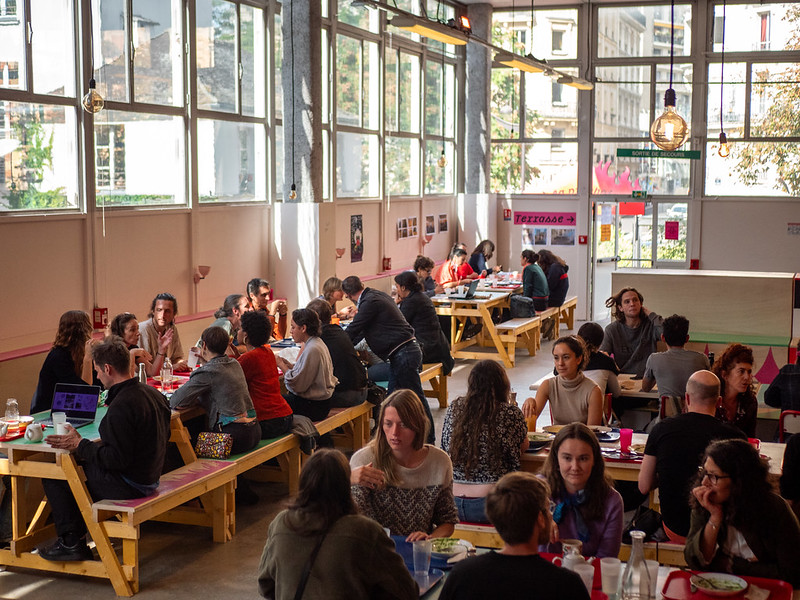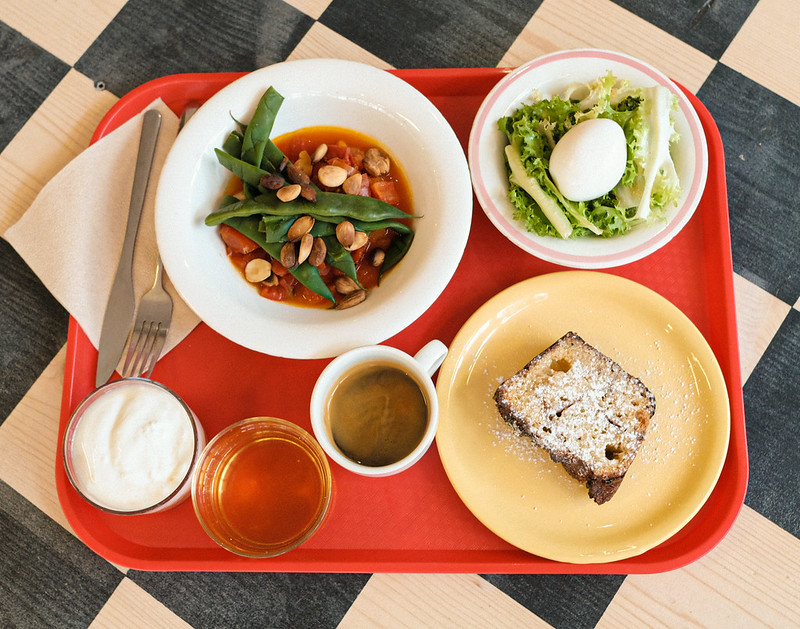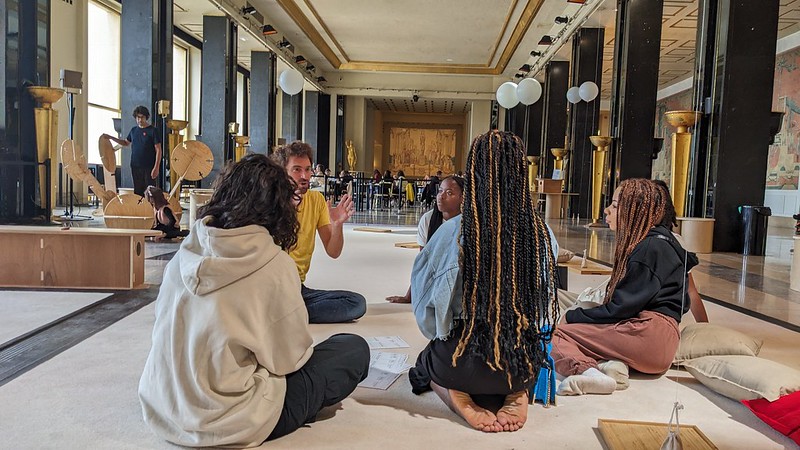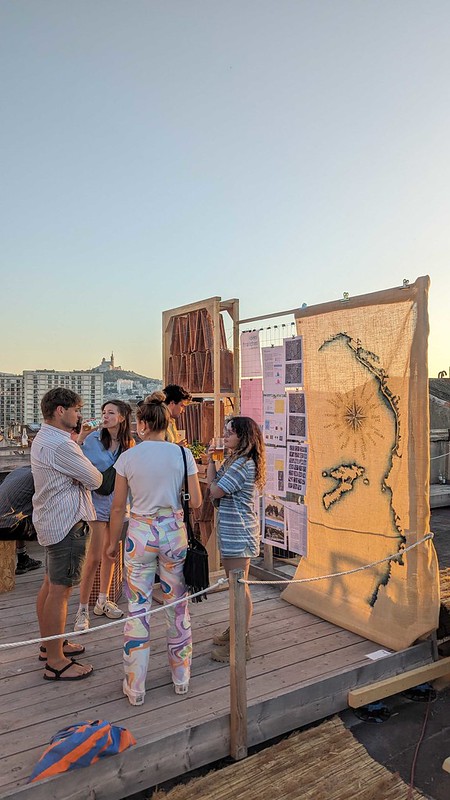Prioritising the places and people that need it the most
Yes We Camp
Yes We Camp: Creating inventive and solidarity-based sites since 2013
Yes We Camp creates and manages inventive and solidarity-based spaces. Our sites have the power to transform social ties, professions and the ways in which people live on this planet through their coexistence of economic, cultural and social uses. With ten years of experience, we’ve earned considerable professional recognition in the field of transitional urban planning. By sharing this experience, we hope to design a future that’s more ecological, more inclusive and far more joyful.
EU Member State, Western Balkans or Ukraine
France
National
No
Yes
France- Bouches-du-Rhône
Mainly urban
It refers to a physical transformation of the built environment (hard investment)
Yes
2020-01-01
Yes
Horizon ; ERDF
No
No
As a representative of an organisation
Since 2013, Yes We Camp has been offering and managing available spaces, with a focus on intensifying usage. Our primary activity is the creation of sites, typically those made available free-of-charge and for a limited time period by public authorities. These alternative and innovative sites are developed by involving those who wish to participate in the design and management process. The specific skills and expertises deployed at each of these sites are activated based on the site’s technical characteristics, the priorities of the local territory and the intentions of Yes We Camp and its partners. The services offered include: reception of vulnerable populations, emergency housing, solidarity-based community kitchens, workshops for artists and craftspeople as well as workspaces for SSE contributers, event space rentals, outdoor spaces managed and designed for family enjoyment, greening projects and biodiversity development, hosting of local initiatives and free cultural events. Since 2017, Yes We Camp has taken on the management of between 5 and 10 sites at any given time, representing a combined surface area of 10,000m² to 20,000m² of building space and 20,000m² to 100,000m² of outdoor space.
We learn in and from these sites. It’s this experience of collective urbanity that we want to share. We regularly hold residencies about our experiences, lasting from a few days to a few months, at the request of town halls and cultural institutions. We provide support and consultancy services throughout France. In Marseille, we run a mobile programme called La Caravanade offering day-long participatory activities (DIY, animation, cooking, hammam). We’ve also created the “Espaces Communs” university diploma, which has become available on a European scale as part of the Erasmus+ programme since 2023.
We learn in and from these sites. It’s this experience of collective urbanity that we want to share. We regularly hold residencies about our experiences, lasting from a few days to a few months, at the request of town halls and cultural institutions. We provide support and consultancy services throughout France. In Marseille, we run a mobile programme called La Caravanade offering day-long participatory activities (DIY, animation, cooking, hammam). We’ve also created the “Espaces Communs” university diploma, which has become available on a European scale as part of the Erasmus+ programme since 2023.
inventive and solidarity-based sites
intensification of use
transitional, urbanism
citizen involvement
cohabitations
Yes We Camp is committed to creating sustainable cities through transitional urban planning:
- The occupation of vacant sites, thereby extending the lifespan of existing spaces and offering an alternative to the construction of new buildings on undeveloped land;
- The mutualisation of uses in an environmentally and socially responsible way;
- Transitional spaces as precursors to long-term urban projects. Take for example the site of Les Amarres. Its owner, Sogaris, will take over the site’s management in 2024 and is currently co-constructing its long-term project based on the project model developed by the association Aurore and Yes We Camp when they co-mangaged the site’s 3-year transitional occupation.
We’re spreading our practices via our Knowledge-Sharing Division (consultancy services and the Espaces Communs university diploma) so that solidarity-based third places can sprout up everywhere (in France as well as in Europe); and, in doing so, we are also creating and providing resources to maximise the chances of these projects succeeding over the long term.
From our point of view, the spatial fabric is a social fabric. The way the city is currently constructed stifles the possibilities for spontaneous appropriation and invention. Residents are seen as consumers or beneficiaries, but rarely as actors in the process.
- The occupation of vacant sites, thereby extending the lifespan of existing spaces and offering an alternative to the construction of new buildings on undeveloped land;
- The mutualisation of uses in an environmentally and socially responsible way;
- Transitional spaces as precursors to long-term urban projects. Take for example the site of Les Amarres. Its owner, Sogaris, will take over the site’s management in 2024 and is currently co-constructing its long-term project based on the project model developed by the association Aurore and Yes We Camp when they co-mangaged the site’s 3-year transitional occupation.
We’re spreading our practices via our Knowledge-Sharing Division (consultancy services and the Espaces Communs university diploma) so that solidarity-based third places can sprout up everywhere (in France as well as in Europe); and, in doing so, we are also creating and providing resources to maximise the chances of these projects succeeding over the long term.
From our point of view, the spatial fabric is a social fabric. The way the city is currently constructed stifles the possibilities for spontaneous appropriation and invention. Residents are seen as consumers or beneficiaries, but rarely as actors in the process.
Yes We Camp’s core activity is to create fertile cohabitations and enable people who don’t necessarily cohabitate to get involved in a collective project. Unconditional hospitality is a cardinal value for us. It is reflected in the aesthetics and programming of all our sites:
Aesthetics include joyful signage (bright colours, rounded shapes), inclusive signage (signs in several languages and with pictograms), open spaces (canteens with large tables conducive to interactions between people) and amenities that lend themselves to daydreaming (large frescoes, cabins). We are adept at adapting this aesthetic to suit different local contexts and publics.
This aesthetic enhances the sensory experience of our sites, which are then supported by programming that follows a number of established principles:
- Accessibility for all, including free access (student rates, the practice of “pending coffee and meals”, a partnership agreement with Le Carillon, affordable catering options, hosting of free events).
- Promotion of local culture. Our cultural programming is eclectic (concerts, lectures, workshops for children and young people, roller disco, open-price meals) and co-constructed around the issues facing the public who benefit from our sites and the areas in which we operate. Examples include the open mic nights at Coco Velten, dedicated to local young people with a passion for urban music; events organised by young people committed to the ecological cause at the Climate Academy refreshment bar; and world music concerts at Les Amarres.
The significance of our site projects in terms of the objective of unconditional hospitality has been assessed by several reports produced by external firms. We will come back to the results of these evaluations in the section “Demonstrated results, outputs or impact of the project”.
Aesthetics include joyful signage (bright colours, rounded shapes), inclusive signage (signs in several languages and with pictograms), open spaces (canteens with large tables conducive to interactions between people) and amenities that lend themselves to daydreaming (large frescoes, cabins). We are adept at adapting this aesthetic to suit different local contexts and publics.
This aesthetic enhances the sensory experience of our sites, which are then supported by programming that follows a number of established principles:
- Accessibility for all, including free access (student rates, the practice of “pending coffee and meals”, a partnership agreement with Le Carillon, affordable catering options, hosting of free events).
- Promotion of local culture. Our cultural programming is eclectic (concerts, lectures, workshops for children and young people, roller disco, open-price meals) and co-constructed around the issues facing the public who benefit from our sites and the areas in which we operate. Examples include the open mic nights at Coco Velten, dedicated to local young people with a passion for urban music; events organised by young people committed to the ecological cause at the Climate Academy refreshment bar; and world music concerts at Les Amarres.
The significance of our site projects in terms of the objective of unconditional hospitality has been assessed by several reports produced by external firms. We will come back to the results of these evaluations in the section “Demonstrated results, outputs or impact of the project”.
The objective of unconditional welcome pursued by our venues implies a particular attention to the notion of inclusion, in particular through :
The inclusive signage described above
Affordable or free services: free events, no obligation to eat in our canteens, "pending coffee and meals".
Open governance circles at all our sites, enabling all stakeholders to participate in decision-making. Each site has a number of governance circles: weekly internal steering circles attended by the structures that run the project, monthly external steering circles attended by the structures that run the project and the main external financial and operational partners, and weekly and monthly life councils that enable the people who use the site on a daily basis to make collective decisions on the site's rules of life.
Our facilities enable as many stakeholders as possible to take part in the decision-making process on a project that concerns them, thereby strengthening their power to act and their sense of consideration.
The inclusive signage described above
Affordable or free services: free events, no obligation to eat in our canteens, "pending coffee and meals".
Open governance circles at all our sites, enabling all stakeholders to participate in decision-making. Each site has a number of governance circles: weekly internal steering circles attended by the structures that run the project, monthly external steering circles attended by the structures that run the project and the main external financial and operational partners, and weekly and monthly life councils that enable the people who use the site on a daily basis to make collective decisions on the site's rules of life.
Our facilities enable as many stakeholders as possible to take part in the decision-making process on a project that concerns them, thereby strengthening their power to act and their sense of consideration.
Our method is simple: we practice co-construction during the entire process of creating our sites. The involvement of the people who will benefit from our sites is made possible through the use of a number of tools, at every stage in the implementation of our projects:
- Phase 1: Start-up phase. We go out and meet local actors (associations, institutions, groups of residents) to find out what are their needs. The links we forge range from simple consultations to the inclusion of these actors in the project’s steering committee.
- Phase 2: Lifespan of the site. A number of mechanisms are put in place to make life in our facilities more fluid. These include: monthly co-programming circles, enabling residents and visitors to propose and/or organise events in the space; weekly or quarterly residents’ councils, to encourage collective decision-making on the rules and regulations of the space; and a number of other events.
We also encourage residents and visitors to get involved in the activities on offer, by means of communication and mediation tailored to our different audiences.
By the close of each project, we learn invaluable lessons. They enrich our commitments and methods, while also proving to be essential to the construction of a sustainable urban project. Feedback from our public/users/beneficiaries at the end of each of our site-based projects is essential to help shape the long-term urban project and fuel our advocacy for transitional urbanism.
- Phase 1: Start-up phase. We go out and meet local actors (associations, institutions, groups of residents) to find out what are their needs. The links we forge range from simple consultations to the inclusion of these actors in the project’s steering committee.
- Phase 2: Lifespan of the site. A number of mechanisms are put in place to make life in our facilities more fluid. These include: monthly co-programming circles, enabling residents and visitors to propose and/or organise events in the space; weekly or quarterly residents’ councils, to encourage collective decision-making on the rules and regulations of the space; and a number of other events.
We also encourage residents and visitors to get involved in the activities on offer, by means of communication and mediation tailored to our different audiences.
By the close of each project, we learn invaluable lessons. They enrich our commitments and methods, while also proving to be essential to the construction of a sustainable urban project. Feedback from our public/users/beneficiaries at the end of each of our site-based projects is essential to help shape the long-term urban project and fuel our advocacy for transitional urbanism.
Yes We Camp relies on a growing, loyal and committed ecosystem; and ensures that its actions are always part of a partnering and/or collaborative approach, no matter the scale:
The start-up phase of our projects–sites are backed by public, private and/or civil society institutions. In Marseille, Coco Velten opened its doors as part of a public innovation laboratory, “Lab Zéro”, organised by the Prefecture of the Région Sud. In Paris, Bercy Beaucoup is part of a concerted development zone programme managed by the City of Paris and SEMAPA.
These institutions provide us with legitimacy and/or financial and strategic support.
Our sites are managed collectively with other associations. At the Auberge Marseillaise, we run the site with eight other local associations (Nouvel Aube, JUST, l’Amicale du Nid, Solidarités Femmes 13, Habitat Alternatif Social, Ligue de l’Enseignement, Marseille Solution and Paysan Urbain).
In most cases, we are responsible for the occupancy agreement for the site, but the operational and financial management is shared between the organisations in the steering team. This enables us to complement our expertises with that of our partner organisations, so that we can create inclusive spaces offering a professional, high-quality environment that welcomes a diverse public. At the Auberge Marseillaise, a place of refuge for 70 women and their children coming from very precarious situations, this partnership structure makes it possible to offer a particularly comprehensive and cross-disciplinary support to the public (access to legal assistance, access to health services, integration assistance for housing, etc.), thanks to the pooling of each organisation’s respective networks, skills and strengths.
The start-up phase of our projects–sites are backed by public, private and/or civil society institutions. In Marseille, Coco Velten opened its doors as part of a public innovation laboratory, “Lab Zéro”, organised by the Prefecture of the Région Sud. In Paris, Bercy Beaucoup is part of a concerted development zone programme managed by the City of Paris and SEMAPA.
These institutions provide us with legitimacy and/or financial and strategic support.
Our sites are managed collectively with other associations. At the Auberge Marseillaise, we run the site with eight other local associations (Nouvel Aube, JUST, l’Amicale du Nid, Solidarités Femmes 13, Habitat Alternatif Social, Ligue de l’Enseignement, Marseille Solution and Paysan Urbain).
In most cases, we are responsible for the occupancy agreement for the site, but the operational and financial management is shared between the organisations in the steering team. This enables us to complement our expertises with that of our partner organisations, so that we can create inclusive spaces offering a professional, high-quality environment that welcomes a diverse public. At the Auberge Marseillaise, a place of refuge for 70 women and their children coming from very precarious situations, this partnership structure makes it possible to offer a particularly comprehensive and cross-disciplinary support to the public (access to legal assistance, access to health services, integration assistance for housing, etc.), thanks to the pooling of each organisation’s respective networks, skills and strengths.
We are an association of paid staff, volunteers and partners, creating an intersection of diverse professions: architecture, urban planning, design, technical management, cooking, social action, collective governance, mediation, artistic creation, landscaping and botany, cultural programming. These fields are complemented by those of our operational partners: social work, construction, artistic production, etc.
Our association is committed to breaking down the barriers between these different professions:
- We operate organically, i.e., we don’t work in silos. Our teams take part in cross-functional and operational meetings (for example, the Cap Commun committee brings together a representative from each of the association’s professional -divisions every 2 weeks to share news from each field of action).
-We’ve adopted the “80/20” system, which allows employees to devote 20% of their working time to exterior missions. This is a great way to discover new skills and enrich our professional practice with the knowledge and know-how of our colleagues.
- We encourage creativity, the right to make mistakes and the richness of learning. At our sites — whether you’re an employee, a beneficiary or just curious — you don’t need to be an expert in DIY to propose and take part in a participative project, or a professional singer to host a karaoke session.
This organic way of working means that we can manage our sites with agility and responsiveness: our paid staff understands the wide range of issues at stake at the sites they manage and know how to react quickly and in a coordinated manner to the problems encountered by our public and users, however diverse they may be. By breaking down the barriers between our various professions, we are also able to host mixed and generous events with fluidity. For example: the Fêtes de l’Îlot, in front of Coco Velten, is a space where games and workshops for young people, festive meals, cultural programming, a sauna, etc. are on offer.
Our association is committed to breaking down the barriers between these different professions:
- We operate organically, i.e., we don’t work in silos. Our teams take part in cross-functional and operational meetings (for example, the Cap Commun committee brings together a representative from each of the association’s professional -divisions every 2 weeks to share news from each field of action).
-We’ve adopted the “80/20” system, which allows employees to devote 20% of their working time to exterior missions. This is a great way to discover new skills and enrich our professional practice with the knowledge and know-how of our colleagues.
- We encourage creativity, the right to make mistakes and the richness of learning. At our sites — whether you’re an employee, a beneficiary or just curious — you don’t need to be an expert in DIY to propose and take part in a participative project, or a professional singer to host a karaoke session.
This organic way of working means that we can manage our sites with agility and responsiveness: our paid staff understands the wide range of issues at stake at the sites they manage and know how to react quickly and in a coordinated manner to the problems encountered by our public and users, however diverse they may be. By breaking down the barriers between our various professions, we are also able to host mixed and generous events with fluidity. For example: the Fêtes de l’Îlot, in front of Coco Velten, is a space where games and workshops for young people, festive meals, cultural programming, a sauna, etc. are on offer.
Through the working group Nouvelles Urbanités, which was set up to coincide with the “Lieux Infinis” exhibition at the French Pavilion of the Venice Architecture Biennale in 2018 and includes twenty actors with a particular focus on the issue of urban planning in France, we are collectively asking the question of how to use what already exists, and how to transform buildings and spaces using mechanisms that are sober and socially impactful, during a time when the construction industry is responsible for 40% of CO2 emissions.
Even though we are aware that the earth’s ecosystem is becoming increasingly fragile, we continue to build more and more, nibbling away at physical resources and natural spaces. With the intention of putting the brakes on this permanent race to build new, we are proposing to make greater use of existing built spaces, by extending working hours and accommodating a myriad of activities on the same site. This is called intensification of use, and it is part of the promise of transitional urbanism.
Even though we are aware that the earth’s ecosystem is becoming increasingly fragile, we continue to build more and more, nibbling away at physical resources and natural spaces. With the intention of putting the brakes on this permanent race to build new, we are proposing to make greater use of existing built spaces, by extending working hours and accommodating a myriad of activities on the same site. This is called intensification of use, and it is part of the promise of transitional urbanism.
Yes We Camp has developed a methodology for activating inventive and solidarity-based sites, explained through 16 key principles:
- Responsive approach, aka listen first: Create “tailor-made” places, the fruit of encounters between the existing context and the intentions we bring to it.
- Work together: Create a place that reflects the interests and contributions of all the parties involved.
- Hospitality: Embody a taste for welcoming others.
- Creativity: Enjoy doing things differently, wanting to invent new things, challenging oneself.
- Presumption of trust: Take care to create peaceful conditions for discovery, presence and involvement.
- Set the pace: Alternate intense sequences with breathing space to allow the site to develop in stages.
- Power of cohabitation: Bring together worlds that don’t usually mingle.
Inhabit: Invest in, embody and inhabit our places to get to know them in a more meaningful way.
- Permanent artistic process: Explore all artistic fields in a continuous process of co-construction.
- Voluntary involvement: Stimulate the desire to get involved, to propose and take part, with the free time available to you, or with ideas and projects.
- Collective freedom, editorial direction: Assume the capacity to choose, encourage or catch-up.
- Multiple market economy: Increase the ease of doing business.
- Lightness: Design our sites as reversible installations, capable of leaving no physical footprint whatsoever
- Travel: What’s the point of going far away, when so close to home there are places of invention and encounter, where it’s natural to discover other cultures and new things to learn?
- Try hard: Create the opportunity to try and invent.
- Joy: Desire a fairer, more vibrant and happier world.
- Responsive approach, aka listen first: Create “tailor-made” places, the fruit of encounters between the existing context and the intentions we bring to it.
- Work together: Create a place that reflects the interests and contributions of all the parties involved.
- Hospitality: Embody a taste for welcoming others.
- Creativity: Enjoy doing things differently, wanting to invent new things, challenging oneself.
- Presumption of trust: Take care to create peaceful conditions for discovery, presence and involvement.
- Set the pace: Alternate intense sequences with breathing space to allow the site to develop in stages.
- Power of cohabitation: Bring together worlds that don’t usually mingle.
Inhabit: Invest in, embody and inhabit our places to get to know them in a more meaningful way.
- Permanent artistic process: Explore all artistic fields in a continuous process of co-construction.
- Voluntary involvement: Stimulate the desire to get involved, to propose and take part, with the free time available to you, or with ideas and projects.
- Collective freedom, editorial direction: Assume the capacity to choose, encourage or catch-up.
- Multiple market economy: Increase the ease of doing business.
- Lightness: Design our sites as reversible installations, capable of leaving no physical footprint whatsoever
- Travel: What’s the point of going far away, when so close to home there are places of invention and encounter, where it’s natural to discover other cultures and new things to learn?
- Try hard: Create the opportunity to try and invent.
- Joy: Desire a fairer, more vibrant and happier world.
Each of our sites reflects a specific geographical and social context. We are firmly opposed to the kind of standardised urban planning that would aim to replicate an urban project in other areas, in an off-the-ground approach. The work of disseminating our sites involves sharing our working methods and tools so that others can adapt them to new geographical and social contexts. This work is carried out by our Knowledge-Sharing Division:
- The Espaces Communs university diploma, which trains 50 students a year in the tools and methods of managing shared spaces through learning trips to third places in France, and now across Europe, as part of Erasmus+’s “BASICC: Building Alternative Skills to Implement Creativities and Commons”. The programme is run as a consortium of 15 partners across Europe, who work in the fields of third places and education.
- Our support services for local authorities and project managers, which provides a methodology based on immersion in the area where the project is to be implemented, and is available in 3 formats:
1)The cross-visit: a guided tour of one of our sites, followed by a visit to the area and/or the site of the project manager.
2)The pre-operational study: a 2 to 3-day workshop in the project manager’s area, combining various formats (visits, surveys, meetings, interviews, public discussions, etc.).
3)The activation residency: a 3 to 6-month immersion on the project site, inspired by the “architectural permanence” methodology of Sophie Ricard and Patrick Bouchain, which enables a detailed reading of the site and its challenges, the construction of a trust-based dialogue between the various project stakeholders and the rapid operational launch of the project.
Lastly, our outreach activity is supported by Yes We Camp’s communication efforts across various outlets (social networks with several thousand subscribers, press, etc.).
- The Espaces Communs university diploma, which trains 50 students a year in the tools and methods of managing shared spaces through learning trips to third places in France, and now across Europe, as part of Erasmus+’s “BASICC: Building Alternative Skills to Implement Creativities and Commons”. The programme is run as a consortium of 15 partners across Europe, who work in the fields of third places and education.
- Our support services for local authorities and project managers, which provides a methodology based on immersion in the area where the project is to be implemented, and is available in 3 formats:
1)The cross-visit: a guided tour of one of our sites, followed by a visit to the area and/or the site of the project manager.
2)The pre-operational study: a 2 to 3-day workshop in the project manager’s area, combining various formats (visits, surveys, meetings, interviews, public discussions, etc.).
3)The activation residency: a 3 to 6-month immersion on the project site, inspired by the “architectural permanence” methodology of Sophie Ricard and Patrick Bouchain, which enables a detailed reading of the site and its challenges, the construction of a trust-based dialogue between the various project stakeholders and the rapid operational launch of the project.
Lastly, our outreach activity is supported by Yes We Camp’s communication efforts across various outlets (social networks with several thousand subscribers, press, etc.).
The experience gained at Yes We Camp sites provides an opportunity to question the way in which cities function today: private property and high prices, single-use and specialisation, gated public spaces that do not encourage civic involvement, resource-intensive construction, diminishing plant and animal life, fewer vacant lots and play areas for children.
In short, our projects–sites are deployed on a local scale and aim to provide elements for a solution to three collective problems:
1) Social fragmentation
The urbanisation of recent decades and the development of technologies and social networks mean that areas are increasingly operating in homogeneous pockets. Public spaces are struggling to become places where people can meet, share and learn. Certain social groups feel marginalized.
2) Individual and collective disengagement
We cultivate and endure an ambient discourse of collective powerlessness: “we no longer have the means, the right or the skills”. Society pushes us to adopt a client-based and passive attitude. We don’t feel legitimate or capable of having a direct say in the organisation and transformation of the spaces we inhabit.
3) The difficulty of moving beyond sectoral approaches to implement the ecological and social transition
Agriculture, the production of goods, mobility, health… Each sector is trying to improve its production processes, but we are struggling to establish cross-sectoral and non-market proposals on the issue of “living together” and the social and economic organisation of territories.
In short, our projects–sites are deployed on a local scale and aim to provide elements for a solution to three collective problems:
1) Social fragmentation
The urbanisation of recent decades and the development of technologies and social networks mean that areas are increasingly operating in homogeneous pockets. Public spaces are struggling to become places where people can meet, share and learn. Certain social groups feel marginalized.
2) Individual and collective disengagement
We cultivate and endure an ambient discourse of collective powerlessness: “we no longer have the means, the right or the skills”. Society pushes us to adopt a client-based and passive attitude. We don’t feel legitimate or capable of having a direct say in the organisation and transformation of the spaces we inhabit.
3) The difficulty of moving beyond sectoral approaches to implement the ecological and social transition
Agriculture, the production of goods, mobility, health… Each sector is trying to improve its production processes, but we are struggling to establish cross-sectoral and non-market proposals on the issue of “living together” and the social and economic organisation of territories.
Over the last 5 years, our facilities have welcomed:
- 1,200 people in emergency accommodation
- 460 organisations (3,000 people), for their work and production spaces
- 450 artists and their works
- hundreds of thousands of visitors and just as many people who have seen or heard the stories of these realities, and have been touched/inspired in their life choices.
Our work has garnered several awards:
2018: French Impact Pioneer, Ashoka Fellow
2019: Tremplin Asso winner
2020: National Young Town Planners Award
2021: Key Player for Change (Fondation de France programme)
2022: Selected for the Grand Prix de l’Urbanisme
As part of the “Tremplin Asso” programme, our projects in priority urban neighbourhoods (Foresta and Coco Velten in Marseille, Saisons Zéro in Roubaix) have been externally evaluated by a number of consultancy firms, focusing in particular on the transformation of individuals through the cohabitation that our projects enable. Here are a few passages from those reports (full texts available in the attachements):
“On the other hand, the association spontaneously seeks to meet the needs of socialisation and appropriation of the area: creation or maintenance of social links, diversity, inclusion and involvement of stakeholders in the area. Yes We Camp addresses this need by transforming its neighbourhoods to make them more welcoming, safer, more dynamic, more mixed and more open to the rest of the urban fabric. Space is conceived as a vector for urban and social cohesion” (Kimso report).
“Generally speaking, Coco Velten is a more diverse place than the average. Minorities are represented to a significant extent, and people who often face exclusion seem to participate in the life of the space in an obvious way” (Convivencia report).
- 1,200 people in emergency accommodation
- 460 organisations (3,000 people), for their work and production spaces
- 450 artists and their works
- hundreds of thousands of visitors and just as many people who have seen or heard the stories of these realities, and have been touched/inspired in their life choices.
Our work has garnered several awards:
2018: French Impact Pioneer, Ashoka Fellow
2019: Tremplin Asso winner
2020: National Young Town Planners Award
2021: Key Player for Change (Fondation de France programme)
2022: Selected for the Grand Prix de l’Urbanisme
As part of the “Tremplin Asso” programme, our projects in priority urban neighbourhoods (Foresta and Coco Velten in Marseille, Saisons Zéro in Roubaix) have been externally evaluated by a number of consultancy firms, focusing in particular on the transformation of individuals through the cohabitation that our projects enable. Here are a few passages from those reports (full texts available in the attachements):
“On the other hand, the association spontaneously seeks to meet the needs of socialisation and appropriation of the area: creation or maintenance of social links, diversity, inclusion and involvement of stakeholders in the area. Yes We Camp addresses this need by transforming its neighbourhoods to make them more welcoming, safer, more dynamic, more mixed and more open to the rest of the urban fabric. Space is conceived as a vector for urban and social cohesion” (Kimso report).
“Generally speaking, Coco Velten is a more diverse place than the average. Minorities are represented to a significant extent, and people who often face exclusion seem to participate in the life of the space in an obvious way” (Convivencia report).
PDF
- DownloadYWC - Rapport moral 2022.pdf
Yes
Yes
Yes
Yes
Yes
Yes
Yes

